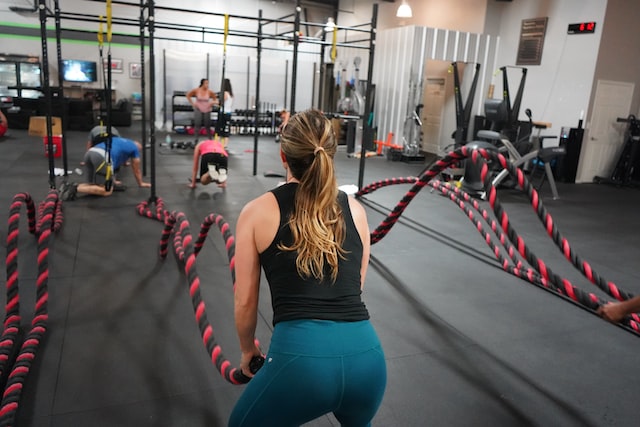Fitness is the state of being physically healthy and strong, crucial for overall health and well-being.
In this article, we will explore the concept of fitness, its different components, its importance, and practical steps for improving and maintaining fitness levels.
Understanding Fitness:

At its core, fitness refers to the condition of being physically healthy and strong. It encompasses various aspects of health, including physical, mental, and emotional well-being. Fitness is not just about having a toned body or being able to lift heavy weights; it involves a holistic approach to health that considers various factors affecting overall well-being.
The Components of Fitness:
Fitness can be broken down into several key components, each contributing to an individual’s overall health:
Cardiovascular Endurance:
Cardiovascular endurance refers to the efficiency of your heart, lungs, and blood vessels in delivering oxygen to your muscles during prolonged physical activity. Good cardiovascular endurance helps improve overall stamina and reduces the risk of heart disease. Activities that enhance cardiovascular endurance include running, swimming, cycling, and brisk walking.
Muscular Strength:
This component involves the maximum amount of force a muscle or muscle group can exert. Muscular strength is crucial for carrying out daily tasks, maintaining proper posture, and avoiding injuries. Strength training exercises, such as weightlifting, resistance band workouts, and bodyweight exercises like push-ups and squats, are effective ways to build muscular strength.
Also read: What Do You Call Leveling Exercise – A Comprehensive Guide!
Muscular Endurance:
While muscular strength focuses on the maximum force, muscular endurance refers to the ability of a muscle to sustain repeated contractions over time. This component is crucial for activities that require prolonged effort, such as running or cycling. Exercises that enhance muscular endurance include high-repetition weightlifting, circuit training, and activities like rowing and dancing.
Flexibility:
Flexibility is the range of motion in your joints and the ability of your muscles to stretch. Improving flexibility can enhance overall mobility, reduce the risk of injury, and improve athletic performance. Stretching exercises, yoga, and Pilates are great ways to enhance flexibility.
Body Composition:
This refers to the proportion of fat and non-fat mass in your body. A healthy body composition typically means having a lower percentage of body fat and a higher percentage of lean muscle mass, which can positively impact overall health. Understanding your body composition can help tailor your fitness goals and nutrition plan effectively.
The Importance of Fitness:
Maintaining fitness is vital for several reasons:

Improved Health:
Engaging in regular physical activity can lower the risk of chronic diseases, including heart disease, diabetes, and obesity. It also strengthens the immune system and improves overall health. Research indicates that individuals who participate in regular exercise are more likely to have lower levels of stress hormones, improved insulin sensitivity, and healthier cholesterol levels.
Enhanced Mental Well-being:
Exercise releases endorphins, which are natural mood lifters. Engaging in regular physical activity can help alleviate stress, anxiety, and depression. Additionally, the focus required during workouts can serve as a form of meditation, helping to clear the mind and promote mental clarity.
Increased Energy Levels:
Regular exercise boosts stamina and reduces feelings of fatigue, allowing individuals to perform daily tasks more efficiently. As your cardiovascular endurance improves, you’ll find everyday activities like climbing stairs or carrying groceries become easier.
Also read: Revolve Fit Guide – Your Ultimate Resource for Finding the Perfect Fit!
Better Sleep:
Physical activity can help regulate sleep patterns, leading to improved quality of sleep and enhanced recovery. Studies suggest that people who exercise regularly fall asleep faster and experience deeper sleep.
Social Interaction:
Joining fitness classes or participating in group activities can provide a sense of community and support, contributing to improved mental health. Social connections can enhance motivation and accountability, making it easier to stick to a fitness routine.
The Importance of Nutrition in Fitness:
While physical activity is a crucial component of fitness, nutrition plays an equally important role. A balanced diet provides the necessary fuel for workouts and aids in recovery. Here are some key points to consider regarding nutrition and fitness:
- Balanced Diet: Consuming a diet rich in fruits, vegetables, whole grains, lean proteins, and healthy fats can support your fitness goals. These foods provide essential nutrients that enhance energy levels, support muscle repair, and improve overall health.
- Hydration: Maintaining proper hydration is crucial for peak performance, as water helps regulate body temperature, lubricate joints, and transport nutrients to cells. Aim to drink plenty of water before, during, and after exercise.
- Timing Your Meals: Proper timing of meals and snacks can impact performance. Eating a balanced meal or snack that includes carbohydrates and protein before and after workouts can help maximize energy levels and promote recovery.
- Supplementation: While it’s best to get nutrients from whole foods, some individuals may benefit from supplements. Consult with a healthcare professional before starting any supplementation regimen to ensure it aligns with your fitness goals and overall health.
How to Improve Your Fitness:

Improving fitness requires a balanced approach that incorporates various types of physical activity.Here are some actionable tips to help you begin:
Establish Achievable Goals:
Define what fitness means to you and set achievable goals, whether it’s running a certain distance, lifting a specific weight, or simply being more active. Using the SMART criteria—Specific, Measurable, Achievable, Relevant, and Time-bound—can help create clear and attainable goals.
Incorporate Variety:
Engage in different forms of exercise, including aerobic activities (running, cycling), strength training (weightlifting, bodyweight exercises), flexibility exercises (yoga, stretching), and recreational sports. Variety not only keeps workouts interesting but also helps prevent overuse injuries and plateaus.
Stay Consistent:
Aim for regular physical activity by engaging in at least 150 minutes of moderate aerobic exercise each week. Incorporate two or more days of strength training to enhance overall fitness. Consistency in your routine is key to developing healthy habits that endure over time. By prioritizing these activities, you can significantly improve your health and well-being.
Listen to Your Body:
Listen to your body’s signals during and after exercise, as they can provide important insights into your fitness levels. Rest and recovery are crucial for preventing injuries and ensuring sustainable progress in your fitness journey.
Incorporate regular rest days into your routine to allow your body to heal and strengthen. Additionally, practices like foam rolling and stretching can significantly aid in recovery, promoting better performance in future workouts.
Seek Professional Guidance:
If you’re unsure where to begin your fitness journey, consider enlisting the help of a personal trainer or fitness coach. They can design a customized workout plan specifically tailored to your needs and goals. Professional guidance offers valuable motivation, accountability, and expertise. This support is especially beneficial for beginners looking to establish a solid foundation in fitness.
Overcoming Barriers to Fitness:

Despite the numerous benefits of fitness, many people face barriers that can hinder their progress. Here are some common challenges and tips to overcome them:
Time Constraints:
Busy schedules often make it difficult to prioritize exercise. To overcome this, consider incorporating shorter workouts or breaking your sessions into smaller segments throughout the day. Even dedicating just 10-15 minutes for physical activity can yield effective results. Consistency is key; finding small pockets of time can help maintain your fitness routine.
Lack of Motivation:
Staying motivated can be challenging, particularly when progress is slow. To maintain enthusiasm, choose activities you genuinely enjoy and consider working out with a friend for added support.
Setting personal challenges can also make your fitness journey more engaging. Additionally, tracking your progress helps create a sense of accomplishment, boosting your motivation to continue.
Also read: Why Is Health And Fitness Important To The Communit – The Role of Fitness and Wellness!
Intimidation or Fear of Injury:
Focusing on learning proper form and technique is essential, as it can significantly reduce the risk of injury. Building confidence in a supportive setting can make all the difference in establishing a consistent fitness routine.
FAQ’s
1. What are the key components of fitness?
The key components of fitness include cardiovascular endurance, muscular strength, muscular endurance, flexibility, and body composition.
2. Why is fitness important?
Fitness is crucial for reducing the risk of chronic diseases, enhancing mental well-being, increasing energy levels, improving sleep quality, and fostering social connections.
3. How can I improve my fitness?
To improve fitness, set realistic goals, incorporate a variety of exercises, stay consistent with your routine, listen to your body, and seek professional guidance if needed.
4. What role does nutrition play in fitness?
Nutrition is vital as it provides the necessary fuel for workouts, aids in recovery, and helps maintain a healthy body composition. A balanced diet supports overall fitness goals.
5. How can I overcome barriers to fitness?
To overcome barriers like time constraints and lack of motivation, try shorter workouts, enjoy fun activities, track progress, and build a supportive fitness community.
Conclusion
In conclusion, fitness is a vital aspect of overall health that encompasses physical, mental, and emotional well-being. By understanding its components and prioritizing regular physical activity alongside proper nutrition, individuals can significantly enhance their quality of life. Embracing a balanced and consistent approach to fitness not only promotes a healthier body but also fosters positive mental health and social connections.